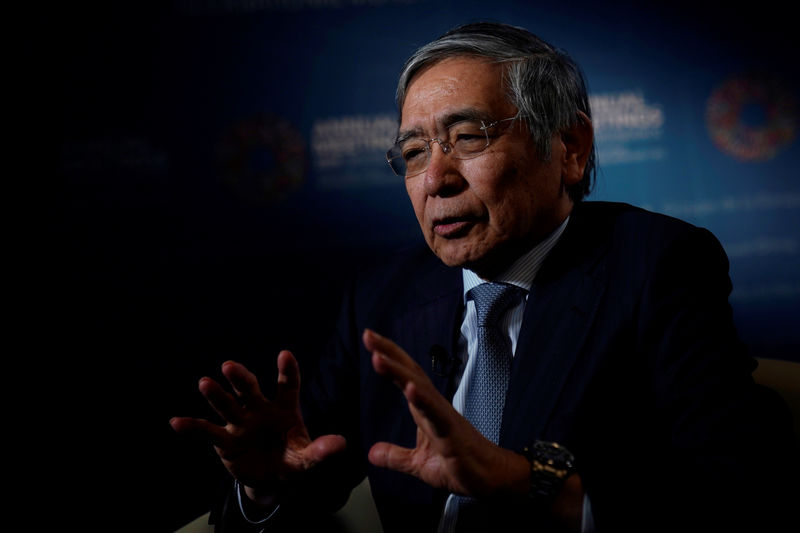By Tomo Uetake
TOKYO (Reuters) - A subtle change in the Bank of Japan's stock buying has sparked debate among market players on whether the central bank is changing its tactics, or even trying to reduce its purchases covertly.
The BOJ has not bought exchange traded funds (ETFs) since Oct. 9, its operation disclosure shows, the longest such spell since the it began buying stocks aggressively under Governor Haruhiko Kuroda as part of its broader efforts to stimulate the economy.
The change suggests the BOJ could reduce stock buying if Japanese share prices stay near current levels -- the highest in a year and not far from three-decade highs touched last year -- even though market players say the BOJ will likely step up buying again if the market falls.
Graphic: BOJ has not bought ETFs more than 5 weeks - https://fingfx.thomsonreuters.com/gfx/mkt/12/8709/8629/BOJ%20has%20not%20bought%20ETFs%20since%20Oct%209.png
What surprised market players even more was that the BOJ stayed out of the market on Wednesday, when the Topix index (TOPX) fell 0.5% in morning trade.
Since the central bank raised its stock buying target to 6 trillion yen ($55 billion) a year in 2016, the BOJ had always bought ETFs on a day when the Topix fell 0.5% or more. It had made purchases occasionally even when the fall was smaller.
"It's almost certain the BOJ wants to trim buying, although whether that will be possible depends on market conditions. If Japanese stocks remain firm until year-end, this year's buying will fall short of 6 trillion yen," said Shingo Ide, chief equity strategist at NLI Research Institute.
So far in 2019, with only 1 1/2 months left to year-end, the BOJ has bought only about 4.0 trillion yen of ETFs, about two-thirds of the official target.
Graphic: The pace of BOJ's ETF buying slows in 2019 - https://fingfx.thomsonreuters.com/gfx/mkt/12/8710/8630/The%20pace%20of%20BOJ's%20ETF%20buying%20slows%20in%202019.png
To be sure, the BOJ said last year that it will flexibly act with its policy target of 6 trillion yen buying per year.
Many analysts expect the BOJ's buying to become more contingent on stock market levels and valuations.
"My interpretation is that the current market level is above the BOJ's self-set threshold that would require support," said Keishi Ueda, strategist at JPMorgan (NYSE:JPM) Securities, referring to the current price/earnings ratio of 14 in the Nikkei (N225).
"But I don't think the BOJ has any hesitation to step in when fundamentals worsens, for instance, if U.S. tariff increases, requiring it to support the market."
This would not be the first time the BOJ changes its stock buying operation. Up until mid last year, the central bank was purchasing ETFs when the Topix fell 0.2% or more, before apparently moving the threshold to 0.5%.
Officially the BOJ has not acknowledged any rules regarding its ETF purchase.
The Bank has also trimmed back its massive bond buying in the last two years.

Graphic: BOJ owns 77 pct of Japan ETFs - https://fingfx.thomsonreuters.com/gfx/mkt/12/8711/8631/BOJ%20owns%2077%20pct%20of%20Japan%20ETFs.png